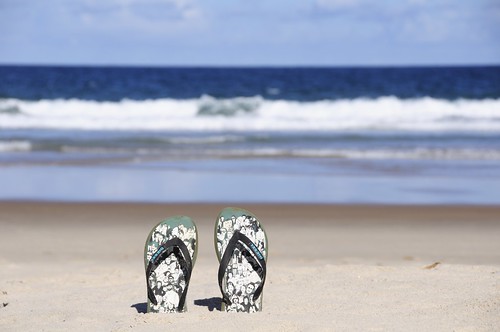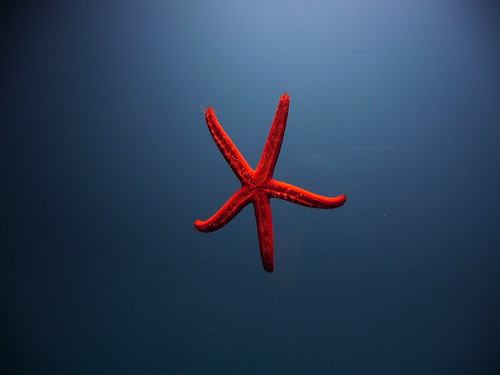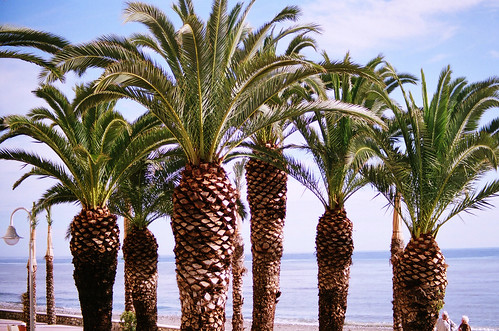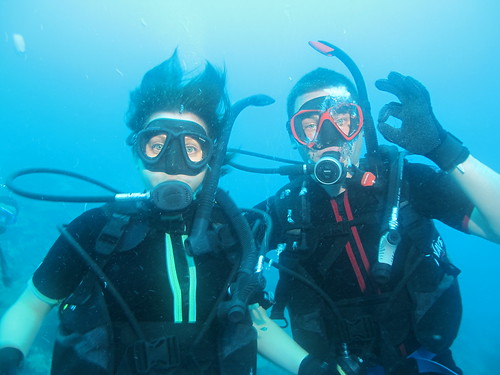German(s) At The Beach Posted by Constanze on Jun 12, 2017 in Culture, Holidays, Language
Guten Tag! Summer is coming, and so this is the time when a lot of people start to plan their holidays. What better way to get you in the mindset for a holiday than by learning some German vocabulary ideal for a trip to the beach? Here is a collection of words you’ll need. I’ve split them up into different categories for easy reference.
CLOTHING & ACCESSORIES
Swimming costume – der Badeanzug
Bikini – der Bikini
Sarong – der Sarong
Swimming trunks – die Badehose
Beach bag – die Strandtasche
Sunglasses – die Sonnenbrille
Flip-flops – die Flip-Flops or, for plastic/rubber shoes: die Gummilatschen
EQUIPMENT

der Schwimmring – inflatable swimming ring. Here in Brezel form! Photo: wicker-furniture on flickr.com under a CC license (CC BY 2.0)
Swimming goggles – die Schwimmbrille
Sun tan lotion – die Sonnencreme / die Sonnenmilch
Deck chair – der Liegestuhl
Towel – das Badetuch
Sand castle – die Sandburg
Shovel – die Schaufel
Inflatable swimming ring – der Schwimmring
Beach ball – der Strandball / der Wasserball
IN THE SEA
Sea – das Meer
Ocean – der Ozean
Wave – die Welle
Starfish – der Seestern
Boat – das Boot
Tide – die Gezeiten
Low tide – die Ebbe
High tide – die Flut / das Hochwasser
Surfing – das Surfen
ON THE BEACH
Sunbathing – das Sonnenbaden
Beach hut – die Strandhütte
Sun tan – die Sonnenbräune
Ice cream – das Eis
Palm tree – die Palme
Coconut – die Kokosnuss
Seagull – die Möwe
Beach – der Strand
Sand – der Sand
VERBS
to swim – schwimmen
to float – schweben
to sail – segeln
to dive – tauchen
to surf – surfen
to tan – bräunen
Germans put their towels down first
Have you heard of the stereotype of Germans getting up extra-early on holiday to put their towels on the deck chairs, as a way of reserving them? This is one German stereotype that is generally considered to be true, and is apparently one of the most annoying things tourists find about beach holidays – so much so, that German tourists themselves find it annoying! There has even been a study to find out why Germans do this. The conclusion? Apparently, Germans don’t need as much sleep and are used to getting up earlier; in Germany most people start work at 8am – as opposed to 9am in the UK.
What do you think about this theory? What do you think about this stereotype? Let me know in the comments! And if you are going on holiday soon, I wish you schönen Urlaub!
Related:

Build vocabulary, practice pronunciation, and more with Transparent Language Online. Available anytime, anywhere, on any device.








Comments:
alcazar:
Maybe a typo, its die Gezeiten 🙂
But “Tide” is also a german word, plattdeutsch (low german) to be precise.
It means “time” oder “gezeiten”.
Constanze:
@alcazar Thank you – spotted that the other day & changed it! Ooh interesting – thanks for adding that, alcazar! 🙂